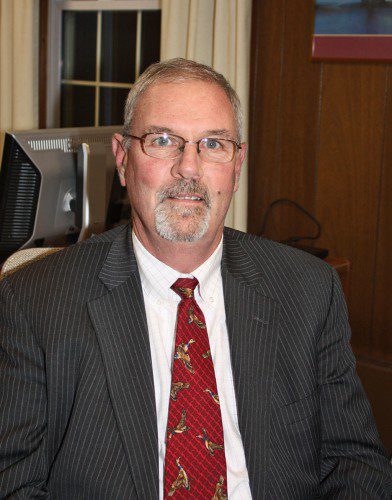By MAUREEN DOHERTY
LYNNFIELD — When retiring Town Administrator Bill Gustus sums up his life’s work, he can reflect on a career spanning both the public and the private sectors that emphasized putting people first.
His accomplishments since arriving in Lynnfield in December 2002 are many and varied but each has helped a segment of the town’s population.
The short list ranges from improved environmental conditions at Pillings Pond and Mill Pond; diversifying the town’s tax base; acquiring two nine-hole golf courses and helping to develop a hot lunch program at Senior Center; to exceeding the town’s obligation in its affordable housing stock; overseeing the completion of the school renovation projects; guiding the MarketStreet project, and improving the town’s financial stability with a bond rating of AA-plus.
The seeds emphasizing the needs of people in a community were sown for Gustus prior to the launch of his professional career when he spent two years in Malaysia volunteering with the Peace Corps after graduating from law school.
Being in Malaysia was an interesting experience, he said. “Back in those days it was not as developed as it is now,” he said. His experience there had a lasting impact. “In fact, two of my children I adopted from Malaysia.”
Upon returning from Malaysia in 1981 he served multiple roles in Middlesex County government over the next six years, including county manager, director of Middlesex County Hospital and county treasurer prior to serving as general counsel for Cummings Properties. He re-entered the municipal sector after a fraternity brother from Wesleyan was elected mayor of Gloucester and he was appointed the city’s CFO. He subsequently served as the Finance Director for the town of Merrimac before becoming Town Administrator in Lunenberg and then Lynnfield.
In addition to his two adopted children, Gustus has four other children and his wife Laura has three. “All in, we got nine of them. There’s five grandchildren and another one the way,” he said.
Being retired will give him more time for family but he isn’t settling into a rocker any time soon. He and his wife are looking forward to running the nine-hole golf course they bought as an investment in their hometown of Lunenberg with their friend, Don Lyons, who is also the director of Golf Operations at Lynnfield’s Reedy Meadow and King Rail golf courses.
“I made the decision I was going to retire at age 62 a couple of years ago. When I negotiated my last contract with the board two years ago I said this would be my last contract,” he said.
He had his eye on Settlers Crossing since the early 2000s when he was Lunenberg’s town administrator prior to coming to Lynnfield. Originally, it was priced too high but years of neglect and a drop in business brought the value down.
“They finally got to a price that we thought we could handle. It was about a year earlier than I had hoped but those opportunities don’t present themselves too often so there was my exit strategy,” he said.
His wife has been running the facility since retiring herself a couple of years ago. “I’ve been out there on weekends but in the summer, she gets there at 6:30 a.m. and doesn’t get home until 9:30 – 10 p.m. I just couldn’t do that to her anymore. It was always our intention to quit when she was 60 and I was 62 and I really couldn’t change my plan because I made a commitment here to a full two-year contract,” he said.
A self-described “hacker” on the golf course, Gustus said he enjoys maintaining the greens, running his big machines and diagnosing fungus problems even more than playing the game.
Volunteering on two projects
Although Gustus has officially retired from Lynnfield employment, he will volunteer his time to assist the town with “a couple of projects I feel strongly about.” The first will be overseeing the final phase of construction at the King Rail golf course, getting it ready for its opening this spring. The second is the rail trail project with Wakefield.
“In terms of unfinished business, there are so many things going on in a town that it’s impossible to finish everything because something new comes up, right up until the last day here. We’re in the middle of the next budget season. I can only take it so far,” Gustus said.
He spent part of his final day last Friday in a meeting with the Conservation Agent and the engineers working on the King Rail Golf Course in preparation for filing a notice of intent for the February Conservation Commission meeting. They are hoping for a May 1 opening date on that project, he said.
As for the rail trail, Gustus said things are moving along as well. “They’ve done all the borings and they’re coming up with a preliminary design so that the committee can begin the process of public hearings and letting people know just exactly what it’s going to look like,” he said. They’re also “getting input on what kind of buffers can be provided for immediate abutters.”
Voters should expect to see a warrant article this spring “to seek Town Meeting approval to enter into a long-term lease with the MBTA to take control of the rail bed,” Gustus said, explaining that since the town would be acquiring an interest in real estate Town Meeting “must be consulted and must it approve before it can be done.”
“It is a unique trail. The plan calls for using some innovative ideas to bring the trail through one of the largest freshwater marshes in Eastern Massachusetts — it is almost one mile through Reedy Meadow — and to do that without impacting the environment in any way.”
It was Gustus who suggested using rolling flatbed rail cars onto the rail bed portion of the path rather than trigger a huge environmental impact in the marsh with new construction. The viability of his proposal is being evaluated. He’s walked this mile long stretch several times and to his untrained eye, the rails don’t look to be in bad shape. “Of course, I’m no engineer, civil or train,” he quipped.
Change agent
“When I first got here the school building projects were just in full swing. The high school was nearing completion, they were getting ready to start the middle school and then they moved on to the elementary schools.”
“Lynnfield is fortunate that their leaders had the wisdom to do that whole thing as one project. The timing could not have been better.” Major changes to the state’s School Building Assistance Program were implemented. “They turned it over to the state treasurer and began giving lump sum payments for the town’s share. We only had to borrow the balance,” he said.
“And the school system is second to none. It has really thrived over the course of the last seven to 10 years. The voters and the selectmen have provided the schools with adequate funding to do all the amazing things they do,” Gustus acknowledged.
The total price tag of all four projects was $65 million. But the total cost to the town was just $24 to $25 million as the town was reimbursed over $40 million.
40Bs and MarketStreet
Chapter 40B projects “were a big issue in the early 2000s in town. We made a decision to buy the Center Golf Course just to avoid a huge 40B development there,” he said as the town entered the golf business for the first time. The revenue was helpful, he said, “but we realized we needed to develop a strategy to meet our obligations under the 40B law. Lynnfield Commons came into play. It was approved by the Board of Appeals.”
Around 2005, when National Development knocked on the town’s door Gustus said they thought “here is our opportunity to meet our obligation to take back control of the town’s destiny in the future as to development.”
Under Gustus’ leadership, the town was able to convince National Development to switch its housing plan from condominiums under a 40B permit, which would have added only 25 percent of the units to the town’s affordable housing inventory, to all rental apartments under the relatively new 40R permit, thereby enabling all 180 units to be counted toward that inventory.
“Now that that’s complete, roughly 12 percent of our total town inventory of housing is classified as affordable,” he said. This is in addition to the economic benefits MarketStreet has brought to the town following the development of the former Colonial golf course land.
“That was quite an undertaking, getting that from beginning to end; all of the negotiations and the different agreements that have to be made, the design standards and the bylaw and all the rest of it,” he said.
Eventually, voters at Town Meeting approved the project and the rest is history as Phase I of MarketStreet has been operational since August of 2013 and Phase II of the development is well underway.
Additionally, the project included land for the 48-unit Colonial Village elderly housing complex, which was recently completed with 12 townhouses and 36 apartments and the land for the town’s second nine-hole course, King Rail, was donated to the town.
Pillings Pond
“I am particularly proud of my work with the Pillings Pond Association and the people around Pillings Pond,” Gustus said, noting how much cleaner the pond is now that the large algae blooms that turned it into a blue-green swamp every summer has been resolved.
He also successfully dealt with the tail end of a lawsuit brought by abutters to Mill Pond, a small pond across the street from Pillings Pond, prior to his tenure. In the end, the $600,000 clean up cost was covered by the town’s insurer and he even convinced the insurer to replace the Pillings Pond dam but not before a judge threatened to send him to jail for contempt for failing to meet a clean up deadline. That deadline was missed, he recalled, due to delays by the DEP in signing off on paperwork, delaying their start of the project.
The town’s insurer agreed to pay for the replacement dam “because when the old style dam was lifted up from the bottom, it sucked up all of the silt from the bottom of the pond and filtered it to Mill Pond across the street. It was later discovered that this silt contained arsenic,” Gustus said. The levels of arsenic were considered hazardous by the DEP, which wanted it removed and treated as a hazardous material.
The new dam is one in which the logs are taken off from the top to allow the water to spill over it. The town just needed DEP to agree that the arsenic levels would drop back to safe levels once the source of the sediment was cut off and the existing soils in the pond could “homogenize” with other soils and wouldn’t have to be removed at a cost of $100 per ton. If the DEP had not agreed, the pollution exclusion in the town’s insurance policy would have been triggered.
“I was asked by the judge ‘Why did you blow the deadline?’ I said, ‘I asked the plaintiffs if we could have a little more time given the fact that we were trying to avoid a $600,000 expense that the town would have had to pay.’ And she looked at me and said, ‘You intentionally violated my court order?'” Gustus recalled. She gave the town one week to comply or he’d be sent to jail. The task was completed by the new deadline.
Proud of Senior Center
“I am particularly proud of the Senior Center. The growth of programs down there has been significant,” he said. Early on in his career he discussed the importance of developing a daily meals program at the Senior Center with Council on Aging Director Linda Naccara.
“We both worked toward making that happen,” Gustus said. “Now they have a first class lunch program serving 75 to 100 people a day. That just helps all the other programs that they run thrive.”
Few regrets
Gustus said he has few regrets but he does wish that one of his initiatives had passed the muster of the voters. “To this day I still wish that I had been able to convince people in this town that pay as you throw is not only viable but a very good way to foster recycling in reducing the waste stream and overall cost of trash,” he said.
“We tried it twice and we got shot down twice. But that doesn’t mean I don’t think it is a good idea. I think that it was a failure to be able to communicate the benefits in a way that people understood it,” he said.
He will miss the people
Gustus said he will miss many things about the town. “Obviously I am going to miss the people more than anything else. I love my job but it’s all about the people and I’ve had the pleasure and honor of working with some very nice people over the years, both on the Board of Selectmen and among the ranks of the town workforce,” including “talented department heads.”
“And there are a lot of civic minded individuals in town, everyone who gets involved on the boards and commissions. … They’re proud of the town and there are some pretty good feelings about where the town is heading. People want to get involved and keep up what’s going on. It’s all about the people,” he said.





